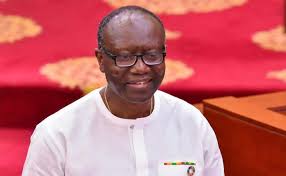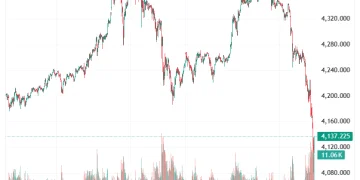Pursuant to the Public Financial Management Act of 2016, Act 921, Section 28; Standing Order 143 of Parliament; and Section 8 of Article 179 of the Republican Constitution, the Finance Minister, Hon. Ken Ofori-Atta, availed of himself to the good people of Ghana through Parliament to present the mid-year fiscal policy review of the 2020 budget statement and economic policy; and supplementary estimate as well as adequate measures put in place by the economic management team to get the national economy back on track.
The mid-year fiscal policy review focused on key sectors of the Ghanaian economy including health, agriculture, and education with strong emphasis on COVID-19 and its devastating effects on the activities of young entrepreneurs, faith-based organisations, transportation, creative arts and media, agriculture, trade and industry, financial services, health, education, and the manufacturing industry.
Hon. Ken Ofori-Atta noted the disruptive effect of COVID-19 on the global economy; and affirmed the President Nana Akufo-Addo-led administration’s resolve to marshal the requisite financial and material resources to protect lives and preserve livelihoods in the midst of the pandemic.
The presentation highlighted essential government projects and initiatives, including but not limited to planting for food and jobs, one-district, one-factory, fish landing sites, inner city and Zongo development, sanitation and water resources, infrastructure for poverty eradication programme (IPEP), livelihood empowerment against poverty (LEAP) programme, free senior high school (Free SHS), school feeding programme, railway sector development, construction of roads and other infrastructural facilities, development of the automobile industry; and the design, construction, equipping, and staffing of new district and regional hospitals in the respective districts and regions with none.
The latter is envisaged to be implemented and constructed under President Nana Akufo-Addo’s “Agenda 111” initiative.
The Finance Minister outlined the macro-economic indicators of the Ghanaian economy as at June 30, 2020. For instance, the nation’s gross domestic product (GDP) growth rate for the first quarter of 2020 was 4.9 per cent. This was 1.8 per cent less than the GDP growth rate recorded over the same period in 2019.
Ghana’s inflation target in the medium term is 8±2 per cent; and the inflation rate as at June 30, 2020 was 11.2 per cent. This was 0.6 per cent shy of the 10.6 per cent recorded earlier in April 2020; and a slight improvement over the 11.3 per cent recorded in May 2020.
However, average inflation rate in August 2020 was 10.5 per cent. This is indicative of the country’s current journey towards economic recovery and eventual growth. The monetary policy rate witnessed 150 basis points reduction from 16 per cent to 14.5 per cent, the cash reserve requirement of deposit money banks (DMBs) was reduced by 2 per cent (that is, from 10 per cent to 8 per cent) while capital adequacy ratio was reviewed from 13 per cent to 11.5 per cent to boost economic activities; and to ease liquidity challenges in the banking sub-sector.
Interest payments on 91-, 182-, and 364-day Treasury bills witnessed significant decrease during the period. This reflected under-performance of equities and other asset classes in the global capital markets during the period. Ghana’s fixed income bond market recorded a significant amount of Ghs 45.6 billion at the end of June 2020. This represented about 161 per cent increase over the Ghs 17.48 billion recorded during the same period in 2019.
The gross international reserves of about US$9.2 billion were equivalent to 4.3 months import cover, which was an improvement over the 4.0 months import cover recorded earlier in December 2019. Fiscal deficit as a percentage of GDP was 6.3 per cent.
This was about 3.2 per cent higher than the targeted fiscal deficit of 3.1 per cent during the period. Ghana’s primary account showed a deficit of 3.3 per cent. This was about 266.67 per cent more than the 0.9 per cent deficit targeted at the end of the second quarter of 2020.
The higher fiscal deficit was a reflection of significant shortfalls in taxes- and non-tax revenues relative to escalated COVID-19-induced expenditures.
Total revenues and grants targeted during the period were GH¢29.759 billion. However, the ravages of COVID-19 enabled the economy to meet about 74 per cent (equivalent to Ghs 22.022 billion) of the target. Total expenditures including arrears clearance were Ghs 46.352 billion.
This was 11.5 per cent more than the total targeted expenditure of Ghs 41.554 billion during the period. Preliminary data on total expenditures on financial sub-sector interventions during the period amounted to Ghs 18.6 billion, equivalent to 4.8 per cent of GDP. However, some figures released later estimated total expenditure on financial bailouts at Ghs 21.7 billion.
As at June this year, the country’s total debt was estimated at Ghs 258.373 billion, equivalent to 67 per cent of GDP. Total payments of GH¢6.49 billion to depositors and clients of defunct three hundred and forty-seven (347) microfinance institutions (MFIs), twenty-three (23) savings and loans companies (S&LCs), and fifty (50) finance house or investment companies (FHCs) were announced in August 2020.
Payments for claims commenced on 1st September, 2020. Payments are effected after claims have been validated by the Receiver and Official Liquidator. The strategic importance of these payments at this time is their ability to ensure strong economic stimulation by making cash readily available to over one million claimants.
Increased money supply is one the recommended measures to wean a country off her liquidity trap fueled by external and internal economic shocks. The current liquidity challenge which has assumed a global dimension was occasioned by the predatory COVID-19 pandemic.
Global economic uncertainties coupled with national economic challenges have compelled downward review of Ghana’s growth target for 2020 from 6.8 per cent through 2.5 per cent and 1.5 per cent to 0.9 per cent.
However, this compares favourably with the -2.1 per cent and -5.1 per cent projected by the World Bank for the African economy; and the 42 per cent contraction rate predicted for the Chinese economy in 2020.
In May, the Chinese government decided to abandon growth targets for the 2020 financial year. Stated differently, the Chinese government resolved not to set any growth target for 2020.
Rather, the President Xi Jinping-led administration is focused on how to encourage higher investment in the private sector; and how to increase consumption and exports to drive growth in the current financial year.
Indeed, the devastating effects of COVID-19 on the Ghanaian, African, and global economies have been dire. This notwithstanding, current managers of the Ghanaian economy are very optimistic; they have resolved to be tactful, diligent, and strategic in their adaption and implementation of measures that could stimulate and assure overall economic success during and after COVID-19.
The decision by President Nana Akufo-Addo’s administration to inject Ghs 100 billion into the Ghanaian economy in the medium term through the COVID-19 Alleviation and Revitalisation of Enterprises Support (CARES) programme may be described aptly as an economic step in the right direction; it is intended to revive the economy; and to chart the path of (strong) growth.
These are strong attributes that could define the resounding accomplishments of the Ghanaian economy in the immediate- and medium term; and beyond. The concerted efforts of well-meaning Ghanaians towards the realisation of the foregoing objective are very paramount.








